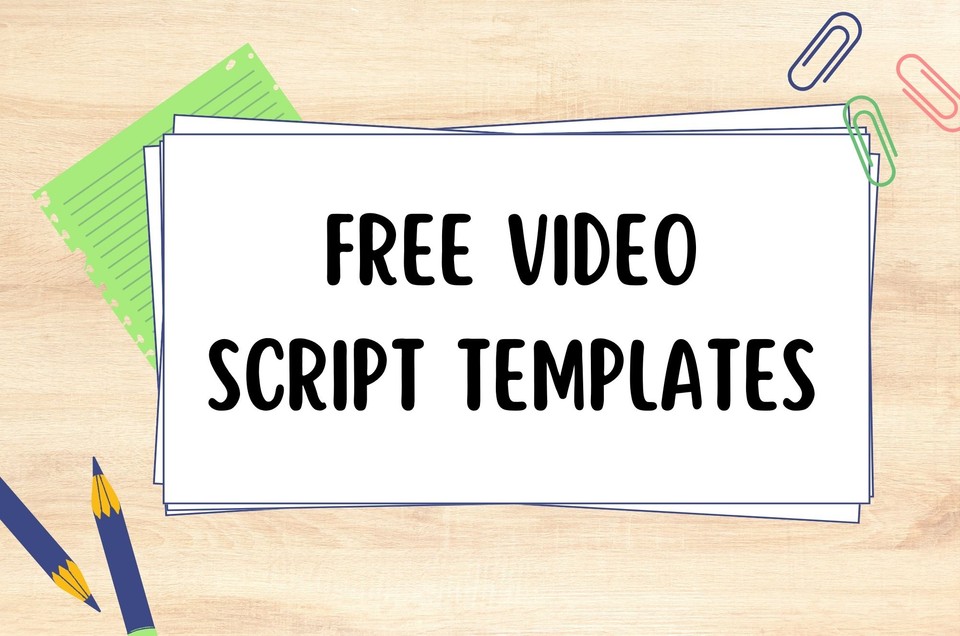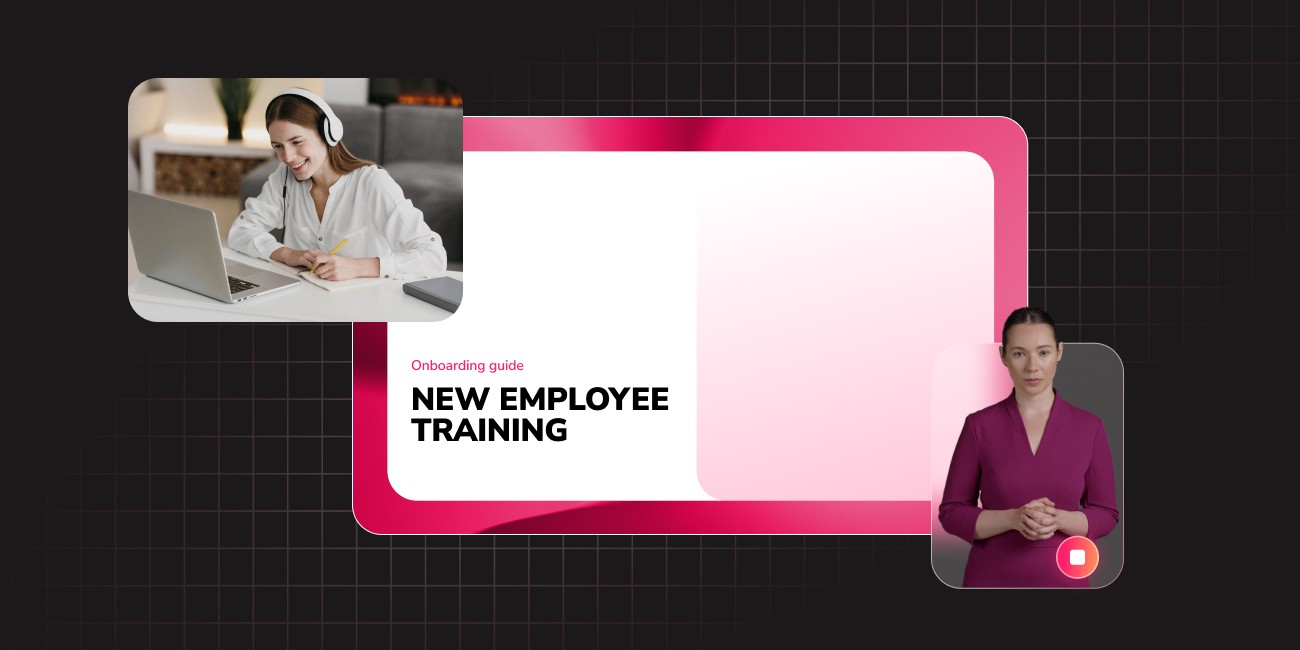Introduction
Most videos lose half their viewers before the 10-second mark. Want to guess the #1 reason? It’s not your camera. It’s not your editing.
It’s your script - or worse, not having one.
Today, I’m handing you the exact free video script template top brands, trainers, and creators use to keep people hooked from “play” to “the end.” And no, it’s not some stiff, fill-in-the-blanks sheet. It’s a framework you can adapt for training videos, onboarding clips, explainer content, product demos, even that 90-second social video you’ve been meaning to make.
If you’ve ever wondered, “What do I even say to keep people watching?”, stick around. We’re going to fix that.

Why Every Video Needs a Script (Yes, Even Yours)
Ever had someone watch your video in front of you, only to catch them checking their phone halfway through?
That’s not bad luck - that’s a weak script.
Even so-called “unscripted” YouTubers plan their beats. They might not write every word, but they’ve mapped their opening hook, their key talking points, and their close. Why? Because a good script is like a GPS. Without it, you wander, you repeat yourself, and eventually, people click away.
There’s hard proof here, too. Videos that tell a cohesive story seeded with a clear beginning, middle, and end see retention rates climb to almost 70%. That’s not magic - it’s structure.
Think about it:
A training manager with a 20-minute onboarding video can either talk in circles for 20 minutes, or walk through a planned sequence that answers every newbie question in order.
An educator can either ramble through a concept or break it down into bite-sized, script-guided points.
The difference is the script. Without it, you’re guessing. With it, you’re leading.
The Different Kinds of Videos That Benefit from a Template
Let’s get one thing clear - there’s no “only for marketing” label on a good video script template. If you’re working in training, internal communications, or education, a template is your secret weapon.
Here are the big categories:
Training & Educational Videos
Think “how to use the new payroll system” or “understanding workplace safety.” A solid script helps you keep it short, clear, and repeatable for the next batch of learners.
Onboarding Videos
This is your first impression for new hires. You want them engaged, not zoning out over your company history.
Negative Hook tip: Never start with “Our company was founded in…” - that’s a snoozefest. Start with a problem they’ll face on day one and how you’ll solve it.
Explainer & How-To Videos
Whether it’s showing how your software works or teaching how to make latte art, a script makes sure each step builds on the last.
Product Demos, Listicles & Promotional Videos
Templates keep you from overhyping or underselling. Every line has a job - inform, entertain, or persuade.
Internal Communication Clips
Got a new policy to announce? A big event? A script ensures you don’t forget key details while keeping the tone on-brand.
The Anatomy of a Video Script Template That Works
A good video script template usually comes in a three-column AV format:
Video column – What’s on screen? (Footage, slides, animations, live action.)
Audio/narration column – What’s being said or heard? (Voiceover, on-camera talking, background sounds.)
Graphics/captions column – Text overlays, logos, diagrams, pop-ups.
Alongside that, many pros use the A.A.A.A. framework:
Attention – Open strong (hooks: direct, controversy, negative).
Agitation – Highlight the problem or gap.
Activity – Show the process, solution, or example.
Action – Clear next step for the viewer.
Mini example – 20-second training video:
Video: Close-up of an employee struggling with software.
Audio: “Ever waste 10 minutes trying to find a single file?”
Graphics: Stopwatch ticking on screen.
Then the fix, step-by-step, ending with “Now you can find it in under 5 seconds.”
How to Make Your Script Sound Human (Not Like You’re Reading)
Let’s be real - the fastest way to kill a good script is to read it like you’re in a high school play.
Here’s how to keep it natural:
Write like you talk – “You’ll see how easy this is” beats “One will observe the process.”
Use short sentences – They’re easier to say and easier to hear.
Add natural pauses – Mark them in the script so you don’t rush.
Drop in pattern interrupts – A sudden question, a quick joke, or a new visual every 20–30 seconds.
Example: An onboarding video doubled its watch time just by swapping “Welcome to the team” for “Here’s the one thing that will make your first week a breeze.”
10 Ready-to-Go Video Script Templates
1. Employee Onboarding Script Template
Scene | Narration | Visuals |
|---|---|---|
1 | Welcome to [Company Name]. We're excited to have you join us. This video will guide you through [Topic]. | Up-close talking head; title of video |
2 | At [Company], we value [Concept 1]. You’ll see this in how we [Action]. | Zoomed-out talking head; animated text timed with narration |
3 | You’ll need to know [Concept 2] and where to find [Resource]. | Zoomed-in talking head; screen showing resource link |
4 | We offer [Benefit list] to support your growth. | B-roll of workplace/team; overlay text |
5 | Our policy on [Concept 3] is simple: [Rule]. If you encounter it, [Action]. | Zoomed-out talking head; animated text with policy |
6 | If you have questions, contact [Contact Info]. Welcome again to [Company]! | Zoomed-in talking head; closing slide with logo |
2. Training Video Script Template
Scene | Narration | Visuals |
|---|---|---|
Title Slide | [Hook question] about [Problem]. | Up-close talking head; title text |
Objectives | Today we’ll cover [Point 1], [Point 2], and [Point 3] so you can [Outcome]. | Zoomed-out talking head; bullet points |
Step 1 | First, [Instruction]. This helps because [Reason]. | Zoomed-in talking head; animation/screen capture |
Example 1 | Watch as we [Demonstration]. | Screen recording or metaphor animation |
Step 2 | Next, [Instruction]. This ensures [Result]. | Zoomed-in talking head; overlay text |
Example 2 | Here’s what it looks like in action. | Screen recording/data graphic |
Step 3 | Finally, [Instruction]. | Zoomed-in talking head |
Wrap-up | Now you know how to [Outcome]. Try it today. | Zoomed-out talking head; call-to-action text |
3. Explainer Video Script Template
Scene | Narration | Visuals |
|---|---|---|
Hook | Did you know [Surprising Fact]? | Close-up talking head; big text animation |
Problem | Most people struggle with [Issue] because [Reason]. | B-roll showing frustration/problem |
Solution Intro | Here’s how to fix it in [Number] steps. | Zoomed-out talking head; numbered list graphic |
Step 1 | First, [Instruction]. | Animation/icon of step |
Step 2 | Then, [Instruction]. | Animation/icon of step |
Step 3 | Finally, [Instruction]. | Animation/icon of step |
Proof | This works because [Stat/Data]. | Data chart animation |
CTA | Try it today and see the difference. | Logo + call-to-action text |
4. Product Demo Script Template
Scene | Narration | Visuals |
|---|---|---|
Intro | Meet [Product Name], designed to [Benefit]. | Close-up of product; overlay text |
Feature 1 | It does [Feature] so you can [Outcome]. | Screen recording or product shot |
Feature 2 | Another perk: [Feature]. | Product in use |
Feature 3 | And [Feature] means [Result]. | Side-by-side before/after |
Recap | In short: [Product Name] gives you [Key Benefit List]. | Montage of product shots |
CTA | Try it free at [Link]. | Logo + website text |
5. Internal Update Script Template
Scene | Narration | Visuals |
|---|---|---|
Hook | Three updates you need to know this week. | Countdown animation |
Update 1 | First, [Change]. This means [Impact]. | Screenshot or photo related to update |
Update 2 | Second, [Change]. Here’s why it matters: [Reason]. | Graphic or icon |
Update 3 | Finally, [Change]. Take note before [Deadline]. | Calendar animation |
Closing | That’s it. Questions? Contact [Person/Dept]. | Zoomed-in talking head; contact info on screen |
6. Storytelling Script Template
Scene | Narration | Visuals |
|---|---|---|
Hook | Let me tell you about the day [Problem] almost ruined everything. | Dramatic B-roll or reenactment |
Build-up | It started when [Context]. | B-roll of setting |
Problem | Then [Conflict] happened. | Relevant B-roll |
Turning Point | Here’s what I did to fix it: [Solution Step 1]. | On-screen list/animation |
Resolution | And here’s the result: [Outcome]. | Before/after shots |
Lesson | What I learned: [Takeaway]. | Text animation |
CTA | Apply this next time you face [Similar Problem]. | Logo or action graphic |
7. Social Media Short Script Template
Scene | Narration | Visuals |
|---|---|---|
Hook | Stop scrolling — you’re missing [Benefit]. | Bold text over quick motion |
Tip 1 | First: [Quick Tip]. | Fast clip showing tip |
Tip 2 | Next: [Quick Tip]. | Fast clip showing tip |
Tip 3 | Finally: [Quick Tip]. | Fast clip showing tip |
CTA | Save this post so you don’t forget. | On-screen save icon animation |
8. Motivational Message Script Template
Scene | Narration | Visuals |
|---|---|---|
Hook | Feeling stuck? | Close-up talking head |
Story | I was there last [Timeframe], until I [Action]. | B-roll of relatable moment |
Tip | Here’s what worked: [Advice]. | Text animation |
Encouragement | If I can, you can too. | Montage of uplifting clips |
CTA | Start today. | Logo + call-to-action text |
9. Event Recap Script Template
Scene | Narration | Visuals |
|---|---|---|
Intro | Here’s what happened at [Event Name]. | Logo and event footage |
Highlight 1 | We kicked off with [Speaker/Activity]. | Clip/photo |
Highlight 2 | Then, [Moment]. | Clip/photo |
Highlight 3 | Finally, [Moment]. | Clip/photo |
Thank You | Thanks to everyone who joined us. | Montage of smiling attendees |
CTA | See you next year! | Closing slide with date |
10. FAQ Video Script Template
Scene | Narration | Visuals |
|---|---|---|
Intro | Today I’ll answer your top [Topic] questions. | Close-up talking head; title text |
Question 1 | “[Question]?” Answer: [Response]. | Text animation of Q; B-roll for A |
Question 2 | “[Question]?” Answer: [Response]. | Same format |
Question 3 | “[Question]?” Answer: [Response]. | Same format |
Closing | Got more questions? Drop them below. | Logo + contact info |
How to Customize a Template So It Doesn’t Feel Like a Template
The danger with templates is sounding like everyone else. Avoid that by:
Matching your tone to your audience (formal for compliance training, casual for creative workshops).
Dropping in real workplace examples.
Swapping generic stock visuals for real footage from your own environment.
Think of a template as a recipe. You don’t serve it straight from the card - you tweak it to taste.
Mistakes People Make With Script Templates
Stuffing too much in – If it doesn’t move the story forward, cut it.
Writing like a textbook – People watch videos, they don’t read lectures.
Ignoring timing – Always read it out loud to check how long it runs.
Quick Takeaways
A video script template is your GPS - skip it and you get lost.
Use hooks (direct, controversial, negative) to keep people watching.
The three-column AV format and A.A.A.A. framework make scripting simple.
Customize templates to match your brand and audience.
Always test for length and natural flow before recording.
Skip the Script Grind with Fliki
If writing scripts feels like pulling teeth, you can let Fliki do the heavy lifting. It’s a smart AI tool that takes your idea, blog URL, or even a PowerPoint and automatically turns it into a complete video - script, AI voiceover, on-screen avatars, and relevant visuals included. Your only job? Feed it the core message, then sit back while it cooks up a polished video faster than you can finish your coffee.
Conclusion
A good script doesn’t just keep you on track - it keeps your audience awake, curious, and actually learning. Whether you’re making a safety training video, walking a new hire through their first day, or launching a product demo, the right video script template turns a jumble of ideas into a clear, engaging story.
Don’t wait to “find the time.” Download a template, tweak it to your voice, and start scripting your next video now. Your audience will thank you - not with polite applause, but with their attention.
FAQs
Focus on clarity, not minutes - but most internal training scripts run best at 3–7 minutes.
You can adapt it, but the video needs tighter pacing.
Use pattern interrupts every 20–30 seconds - change visuals, tone, or ask a quick question.
Yes - even a rough outline stops you from missing key points.



